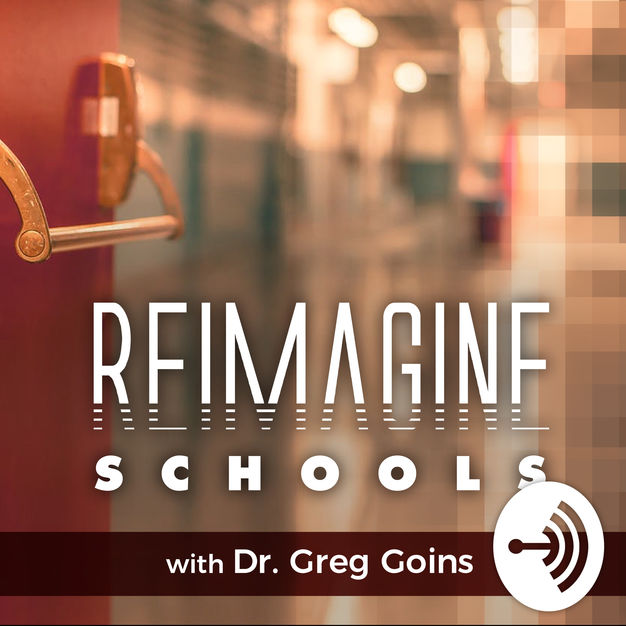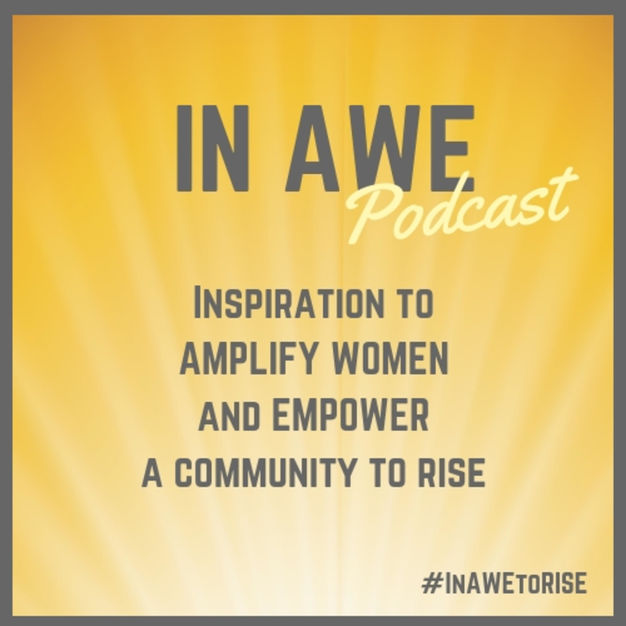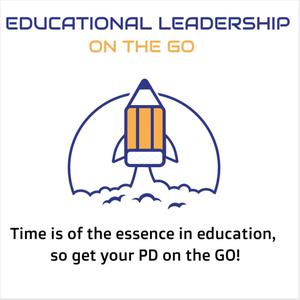
Rising Tide Radio: The Podcast for Women in Educational Leadership
Allyson Apsey/Jennifer Hogan
Welcome to Rising Tide Radio, the podcast for women in education leadership. Your hosts are Jennifer Hogan and Allyson Apsey. Join us each month for a discussion about leadership and life lessons that will leave you inspired and motivated.
- 11 minutes 18 secondsRising Tide Radio Episode 21: Well-Being Part 4 (of 4-part series)
In this fourth segment of the 4-part series on well-being, Jennifer Hogan and Allyson Apsey discuss how gratitude impacts well-being. Well-being is listening to your heart, your mind and your body and then taking specific action based on what you hear. This careful listening and action steps lead to us becoming the best version of ourselves. This contributes to our own personal satisfaction with life and allows us to be the people we want to be for everyone around us. The roadmap to personal well-being looks different for everyone, but there are some universal truths and ideas that can help us all.
In this episode you'll discover:
-Who we first heard talk about the gratitude as an intentional practice
-How Oprah starts her day (and how Allyson starts hers)
-Findings from Brene Brown's research on gratitude
-An easy-to-use strategy for practicing gratitude at meetings
-How Allyson creates a culture of appreciation at her school
-Acknowledgement of well-being as personal responsibility as well as the importance of a healthy work environment
Resources:
Brene Brown on Joy and Gratitude (Video) https://www.youtube.com/watch?v=2IjSHUc7TXM&list=RDLVlgKtDbxDt7k&index=3
Rising Tide Radio - Episode 14: Looking for the Gifts https://anchor.fm/risingtide/episodes/Rising-Tide-Radio-Episode-14-Looking-For-the-Gifts-ekpr0n
One Simple Habit to Improve Mood and Productivity - The Compelled Educator
http://www.thecompellededucator.com/2020/11/one-simple-habit-to-improve-mood-and.html
The Power and Simplicity of a Weekly Staff Check-In
https://allysonapsey.com/2020/02/10/the-power-and-simplicity-of-a-weekly-staff-check-in/
Allyson's TikTok video: https://www.tiktok.com/t/TTPd2tjkn3/
Where to find Allyson:
Twitter: @AllysonApsey
Website: https://AllysonApsey.com.
Where to find Jennifer
Twitter: @Jennifer_Hogan
Website: http://www.TheCompelledEducator.com
30 November 2021, 1:40 am - 14 minutes 9 secondsRising Tide Radio Episode 20: Well-Being Part 3 (of 4-part series)
In this third segment of the 4-part series on well-being, Jennifer Hogan and Allyson Apsey discuss taking steps to have healthy bodies and healthy minds. Join Jennifer and Allyson on their journey to well-being.
Well-being is listening to your heart, your mind and your body and then taking specific action based on what you hear. This careful listening and action steps lead to us becoming the best version of ourselves. This contributes to our own personal satisfaction with life and allows us to be the people we want to be for everyone around us. The roadmap to personal well-being looks different for everyone, but there are some universal truths and ideas that can help us all. We look forward to exploring them in this four-part series. This is part three in our series. We'll talk about self-efficacy and how it impacts our well-being.
In this episode you'll discover:
-The top three responses educators across the country give as their answer to the question, "What might make a teacher feel unsafe at school?"
-The definition of self-efficacy by psychologist Albert Bandura, whose social learning theory is used in classrooms today.
-How goal-setting, positive affirmations, and William Glasser's Behavior Car can help improve self-efficacy
-A simple yet powerful "Reflection & Projection" exercise that can be added to one's self-efficacy toolbox.
Resources from this episode:
Self-Efficacy by Albert Bandura
Increasing transformational leadership through enhancing self‐efficacy - Journal of Management Development
Albert Bandura’s Social Learning Theory at SimplyPsychology.org
What we do and how we think determine how we feel at Serendipity in Education
Happier Podcast by Gretchen Rubin
You are always enough at TheCompelledEducator.com
15 November 2021, 1:10 pm - 17 minutes 31 secondsRising Tide Radio Episode 19: Well-Being Part 2 (of four-part series)
In this second segment of the 4-part series on well-being, Jennifer Hogan and Allyson Apsey discuss taking steps to have healthy bodies and healthy minds. Join Jennifer and Allyson on their journey to well-being.
Well-being is listening to your heart, your mind and your body and then taking specific action based on what you hear. This careful listening and action steps lead to us becoming the best version of ourselves. This contributes to our own personal satisfaction with life and allows us to be the people we want to be for everyone around us. The roadmap to personal well-being looks different for everyone, but there are some universal truths and ideas that can help us all. We look forward to exploring them in this four-part series. This is part two in our series. We'll talk about the importance of moving your body and how it affects your overall well-being. We’ll also talk about having a healthy mind which includes thoughts, mood, and influences.
In this episode you'll discover:
-Allyson's tip for healthy self-talk
-How technology can help with our need for socializing
-The importance of mindset in the mind-body connection
-Jennifer's personal battle with stress and exercise during her principalship
Resources from this episode:
7 surprising ways walking can benefit your body and your mind by USA Today
Spark by John Ratey
7 Habits for a Healthy Mind in a Healthy Body - Psychology Today
20 Ways to Take Care of Yourself over the Holidays - The Compelled Educator
Fake it until you make it or Face it until you make it? - Serendipity in Education
We would love to connect with you! You can share your challenges and treasures on social media using the hashtag #RisingTideRadio
1 November 2021, 7:44 pm - 18 minutes 21 secondsRising Tide Radio Episode 18: Well-Being Part 1 (of 4-Part Series)
In this first segment of our 4-part series on well-being, Jennifer Hogan and Allyson Apsey discuss asking for help and setting boundaries. Join Jennifer and Allyson on their journey to well-being.
There are five main aspects of personal health: physical, emotional, social, spiritual, and intellectual. Well-being is listening to your heart, your mind and your body and then taking specific action based on what you hear. This careful listening and action steps lead to us becoming the best version of ourselves. This contributes to our own personal satisfaction with life and allows us to be the people we want to be for everyone around us. The roadmap to personal well-being looks different for everyone, but there are some universal truths and ideas that can help us all. We look forward to exploring them in this four-part series.
While brainstorming on this topic of well-being, we wanted to provide practical take-aways, especially now during the pandemic when a leader’s well-being can be compromised without some intentional focus and making it a priority. We see 1) asking for help and 2) setting boundaries as two important factors towards positive emotional and social wellbeing.
In this episode you'll discover:
-a phrase you can use when asking for help
-Allyson's serendipitous gift she received due to the pandemic
-one important boundary you can set for yourself and your team
Resource Links:
Wellness Pause from Serendipity in Education
7 Reasons to Not Send Emails on Weekends from Serendipity in Education
How to Say No Politely by TheCompelledEducator.com
5 Steps to Mental Well-being National Health Service, United Kingdom
We would love to connect with you! You can share your challenges and treasures on social media using the hashtag #RisingTideRadio
18 October 2021, 11:30 am - 23 minutes 36 secondsRising Tide Radio Episode 17: A BIG announcement from Jennifer!Join Allyson Apsey and Jennifer Hogan as they have a conversation full of wisdom, fun and connection for female leaders.9 June 2021, 10:47 pm
- 18 minutes 23 secondsRising Tide Radio Episode 16: COVID-KeepersJoin Allyson Apsey and Jennifer Hogan as they reflect on 2020 and share the unintended changes and lessons that COVID provided that they want to carry forward.24 February 2021, 10:45 pm
- 17 minutes 6 secondsRising Tide Radio Episode 15: Three Tips for Coaching ConversationsListen as Jennifer and Allyson discuss ways they’ve grown as leaders. In this episode, they share three tips they learned to have successful coaching conversations.2 December 2020, 2:09 am
- 15 minutes 30 secondsRising Tide Radio Episode 14: Looking For the GiftsJoin Jennifer Hogan and Allyson Apsey as they share the some of the gifts and benefits of something we would’ve never chosen for ourselves—-a global pandemic.8 October 2020, 10:16 pm
- 25 minutes 16 secondsEpisode 13: Caring for the Whole TeacherJoin Jennifer Hogan and Allyson Apsey as they share 5 do’s and 3 don’ts when caring for the whole teacher.15 May 2020, 6:05 pm
- 22 minutes 33 secondsRising Tide Radio Episode 12: Taking care of ourselves during the COVID-19 pandemic
As educators, we love the flexibility in our typically tightly-structured schedule that comes along with school holidays. But, if we were really being honest with ourselves, we usually function best with a schedule and a mountain of things on our to-do list. It will be tempting to binge-watch television series during our COVID-19 break, and there is no shame in doing that, but we will feel much better if we also feel accomplished.
In this episode, we share the #COVID19selfcare challenge, a daily list of actions that we commit to doing while on the extended break from school.
Learn more:
The #Teacher26 "virtual marathon" - the brainchild of Dr. Dave Schmittou
The DONE app, for habit tracking
The 75 Hard Challenge by Andy Frisella
Share your personalized challenge list on social media with the hashtag #COVID19selfcare
17 March 2020, 12:53 am - 23 minutes 18 secondsRising Tide Radio Episode 11: Being An Authentic Leader Without Being a Complainer
In this episode, Allyson and Jennifer talk about being an authentic leader without being a complainer.
- Is it possible for leaders to be "too positive"?
-Brene Brown uses a term called "silver-lininging" in her TED Talk titled, “The Power of Vulnerability”
-How this relates to the video titled, "It's not about the nail"
-We refer to Melody Stacy's post, "5 Ways to Ensure Positivity Doesn’t Become Toxic"
-Allyson shares the 3 don'ts of empathy from her book, Through the Lens of Serendipity
-As leaders, it is important that we model the behavior we want to see
-Two resources are recommended: A Complaint-Free World, by Will Bowen and Option B: Facing Adversity, Building Resilience, and Finding Joy by Sheryl Sandberg and Adam Grant
-A challenge for our listeners: Will Bowen's 21-day COMPLAINT-FREE challenge. Read more at his site: https://www.willbowen.com/complaintfree/
Remember to share your treasures and challenges with us on social media using the hashtag #RisingTideRadio. We love being a part of your journey!
4 March 2020, 1:56 am - More Episodes? Get the App
Your feedback is valuable to us. Should you encounter any bugs, glitches, lack of functionality or other problems, please email us on [email protected] or join Moon.FM Telegram Group where you can talk directly to the dev team who are happy to answer any queries.
 We Love Schools
We Love Schools
 School Leadership Reimagined
School Leadership Reimagined
 Reimagine Schools
Reimagine Schools
 In AWE Podcast
In AWE Podcast
 Educational Leadership On The Go
Educational Leadership On The Go